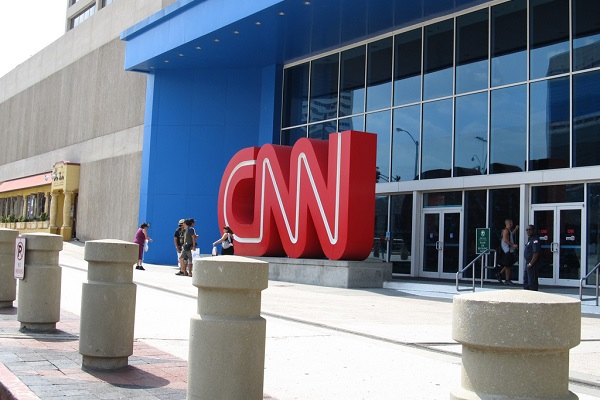
–>
May 30, 2022
Of late, the State appears to be an analogue to the mafia. For one piece of evidence, we can look to the inclusion in its main repertoire a mob tactic once used only sparingly: the bust out.
‘); googletag.cmd.push(function () { googletag.display(‘div-gpt-ad-1609268089992-0’); }); }
A bust out is a mob tactic whereby a business-owner becomes indebted or obliged to a mobster, who subsequently coerces the business-owner to finance criminal operations on his company’s credit. After multiple refinancing options and mortgages, the mafia burns down the overleveraged business and collects the insurance money.
The pre-eminent example of the State acting on its new modus operandi is CNN. With the arrival of the Zucker regime, the State attained effective control of the company and immediately initiated a credibility bust out on its brand, leveraging every ounce of its reputation to serve the various enterprises of the State, until the network became a laughingstock that was disowned even by stalwart Democrats and go-along-get-along suburban paper-pushers. Years of outright lying and transparent propaganda (Russiagate; the Covington kids farce; the Rittenhouse trial; and many, many others) obliterated the last pretense CNN could cling to for promoting itself as a “straight-shooting, down the line” news network.
Aside from the absurd magnificence of its downfall, what occurred with CNN was hardly anomalous; rather, it was merely a conspicuous example of an increasingly common State initiative whereby the State acquires control of a pre-existing institution and leverages its brand to serve its own ends.
‘); googletag.cmd.push(function () { googletag.display(‘div-gpt-ad-1609270365559-0’); }); }
Michael Lind, in a recent essay, chronicles in glorious detail how the State, through leveraged buyout campaigns coordinated primarily (though not exclusively) through an interlocked network of NGOs, acquires institutions that hold widespread brand recognition — CNN, National Review, the ACLU, the CDC and WHO, and so on — and repurposes their respective brands in the interests of the State. He writes, “[The] centralized and authoritarian control of American progressivism by major foundations and the nonprofits that they fund [i.e., the State] … has made it impossible for there to be public intellectuals on the American center-left” (emphasis added). In the same essay, Lind refers to a similar “extinction level event,” where “foundation-imposed groupthink triumphed on the right, consolidating Conservatism, Inc. and driving away those of us who sought to put the life of the mind above the life of the party.”
Lind’s essay is perhaps the best overview of the mechanics of how the State, through its various proxies, the NGOs and foundations, acquires sundry “independent” institutions and strips away their core founding principles. The ACLU ceases to promote civil liberties; the AMA ceases to uphold medical standards; the AFL-CIO ceases to work effectively on behalf of labor. All of these institutions, as they fall in thrall to the State, inevitably shed their individual identities and become mere extensions of the State, whereupon they become identical with each other and incoherent within themselves, the incoherence gradually revealing itself as each institution invariably betrays its core mission in deference to the State’s agenda in the most crucial junctures. Eventually, the missions and reputations of these institutions collapse into mere brands; their leaders become mascots; both exist merely so that their residual credibility can be laundered to the State so as to advance the State’s current project, until their credibility goes to zero and the bust out is complete.
Lately, the incoherence of these institutions has become so pronounced that it has acquired a brand of its own: The Current Thing. The term has become synonymous with a class of people (and institutions) so completely in thrall to the State that they have lost all personal integrity, not in the sense of abandoning their commitment to their deeply cherished principles or virtues (most people have none), but in the older, more literal sense of being disintegrated — i.e., losing all coherence and consistency as thinkers and actors. The right thing to do is always what the State is promoting at the current moment, even when radically incompatible with what the State promoted a day earlier. So one moment, every American is bound to stay home and Save Lives! The next moment, Americans are not only permitted, but practically obliged to protest in large numbers against Racial Injustice! Protesting for any other cause, however, rendered one a depraved “freedumb person.” But “freedom” recovers its status as a foundational moral value (and its traditional spelling) in the context of promoting Ukrainian Freedom! And so it goes.
While the Current Thing seems bizarre when confronted at a surface level, upon closer inspection, it as a predictable consequence of the State’s strategy of institutional brand acquisition. The majority of people do not hold themselves accountable for the internal coherence of their moral propositions through dispassionate self-reflection; rather, they are held to account by the collective judgment of like-minded individuals and the institutions and organizations in which they collectively participate. Before its acquisition by the State, the ACLU, to take one example, would have reinforced the commitment of its contributors to the cause of civil liberties, independent (to a degree) of the prevailing partisan dynamics. Today, the ACLU is conspicuous even among captured institutions in its servile adherence to the Current Thing, and so brand loyalty to that organization merely leads to lockstep conformity among its acolytes to the State’s program. Meanwhile, a true believer in civil liberties can affirm his convictions only by disavowing the ACLU.
While this might not seem like much of a hurdle, one needs to extrapolate this phenomenon to the panorama of mid-level American institutions, advocacy groups, unions, professional associations, political parties, even churches. As these entities are gradually bought out by the State, they proceed to launder the residual institutional loyalties and commitments into an all-encompassing (though never explicitly professed) State Loyalty, whereupon they essentially herd all their acolytes simultaneously into the Current Thing, which, again, is nothing except whatever the State is pushing at any given moment.
What this amounts to is a bust out of the American Institutional Class in its entirety. As the State proceeds in its march through the institutions, one by one corrupting them all, we are left in a world where, to quote Chris Hedges, “doctors destroy health, lawyers destroy justice, universities destroy knowledge, governments destroy freedom, the press destroys information, religion destroys morals, and our banks destroy the economy.” All noble truths, but useless unless we simultaneously recall that in the process of debasing themselves and their professions, all these actors are devoted in their service to the State.

‘); googletag.cmd.push(function () { googletag.display(‘div-gpt-ad-1609268078422-0’); }); } if (publir_show_ads) { document.write(“
Image: Ken Lund via Flickr, CC BY-SA 2.0.
<!– if(page_width_onload <= 479) { document.write("
“); googletag.cmd.push(function() { googletag.display(‘div-gpt-ad-1345489840937-4’); }); } –> If you experience technical problems, please write to [email protected]
FOLLOW US ON
<!–
–>
<!– _qoptions={ qacct:”p-9bKF-NgTuSFM6″ }; ![]() –> <!—-> <!– var addthis_share = { email_template: “new_template” } –>
–> <!—-> <!– var addthis_share = { email_template: “new_template” } –>







